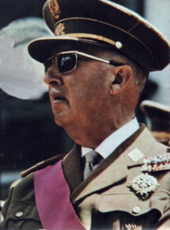Caudillo
Caudillo is a Spanish functional designation that can originally be translated as "Oberhaupt" or "Heerführer", in the modern sense with "Leader" or in Franquism (deliberately based on German and Italian fascism ) with "Führer".
Today Caudillo describes an authoritarian male politician in Latin America. A caudillo often appears as a charismatic populist or with a revolutionary program. The rule of a caudillo is called caudillismo or caudillism .
The Spanish word caudillo goes back to old Spanish cabdillo in Latin capitellum , a diminutive of the Latin caput "head". It has the same origin as the German word Kapitell .
history
In medieval texts, the term caudillo was used as an honorary title for a military leader who had emerged victorious in the reconquest of the Iberian Peninsula (see Reconquista ). After that, the name fell out of use. Between 1820 and 1870, the term caudillo was used in Latin America to refer to a military leader who seized power when civilians were unable to maintain authority in the country.
According to some sources, the word caudillo is said to have a negative connotation and to denote as caudillaje the arbitrary rule of an officer or a large landowner. The fact that the name is even found in the Himno de Riego , a song that celebrates the Spanish revolutionary Rafael del Riego and was the revolutionary battle song of the national anthem of Spain during the Second Republic, speaks against a negative connotation . However, the fourth verse of the song (which begins with the words Honor al caudillo , "Glory to the Caudillo") was not part of the official anthem.
The expression became famous because the Spanish dictator Francisco Franco was called Caudillo after he had been appointed commander-in-chief of all rebel forces ( generalissimo ) and assumed the office of head of state and government in autumn 1936 . Apparently he was inspired by the terms “ Führer ” and “Il Duce” from other European dictators. With the death of Franco and the end of Franquism, the word fell out of use.
In recent years the term has been used more and more in the press due to its application to South American politicians such as Hugo Chávez .
Preconditions
The characteristics that characterize a caudillo are generally a strong personality, ambition for power, charisma, courage and the ability to lead political / military positions, but often also cruelty, ruthlessness and brutality.
The following factors favor the rise of a caudillo:
- bad economic situation (little income, debts)
- inefficient bureaucracy
- general economic or cultural underdevelopment (e.g. illiteracy )
- Lack of communication opportunities
- Tradition of macho or violence
Examples of caudillos

Argentina
- Juan Manuel de Rosas (1793–1877), Governor of Buenos Aires
- Juan Facundo Quiroga (1788–1835), governor of the province of La Rioja and military leader
- Juan Perón (1895–1974), two-time President of Argentina
Chile
- Bernardo O'Higgins (1778-1842), Director Supremo
Cuba
- Fidel Castro (1926 / 1927–2016), Cuban revolutionary leader and head of state
Mexico
- Antonio López de Santa Anna (1794–1876), President
- Emiliano Zapata (1879–1919), revolutionary
Spain
- Francisco Franco (1892–1975), Spanish dictator and generalissimo
Venezuela
- José Antonio Páez (1790–1873), President
- José Tadeo Monagas (1784–1868), President
- Cipriano Castro (1859-1924), President
- Ezequiel Zamora (1817–1860), Civil War general and peasant leader
See also
literature
- Walther L. Bernecker , Hans-Jürgen Fuchs, Bert Hoffmann et al .: Spain Lexicon. Verlag CH Beck, 1990, ISBN 3-406-34724-X
- Michael Riekenberg : Caudillism . A short treatise based on the La Plata area , Leipzig 2010, ISBN 978-3865832986
Web links
Individual evidence
- ↑ A caudillo named Rajoy. In: www.handelsblatt.com (official homepage). Retrieved October 2, 2017 .
- ↑ Enrique Moradiellos: Franco, el caudillo: origen y perfil de una política magistratura carismática . In: Historia y Política . tape 0 , no. 35 , 2016, ISSN 1989-063X , p. 261–287 , doi : 10.18042 / hp.35.11 ( fecyt.es [accessed December 4, 2019]).
- ↑ Fernando Díaz Díaz - Caudillos y Caciques, El Colegio de México 1972 - Enrique Krauze, El amor a la tierra, Emiliano Zapata - Fondo de Cultura Económica - Mexico DF 1987 - and ... Emiliano Zapata Wikipedia en español
